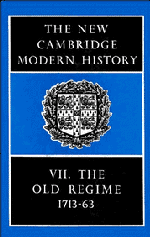Book contents
- Frontmatter
- CHAPTER I INTRODUCTORY SUMMARY
- CHAPTER II THE GROWTH OF OVERSEAS COMMERCE AND EUROPEAN MANUFACTURE
- CHAPTER III THE SOCIAL CLASSES AND THE FOUNDATIONS OF THE STATES
- CHAPTER IV THE VISUAL ARTS AND IMAGINATIVE LITERATURE
- CHAPTER V THE ENLIGHTENMENT
- CHAPTER VI RELIGION
- CHAPTER VII MONARCHY AND ADMINISTRATION
- CHAPTER VIII THE ARMED FORCES AND THE ART OF WAR
- CHAPTER IX INTERNATIONAL RELATIONS
- CHAPTER X THE DECLINE OF DIVINE-RIGHT MONARCHY IN FRANCE
- CHAPTER XI ENGLAND
- CHAPTER XII THE WESTERN MEDITERRANEAN AND ITALY
- CHAPTER XIII THE ORGANISATION AND RISE OF PRUSSIA
- CHAPTER XIV RUSSIA
- CHAPTER XV SCANDINAVIA AND THE BALTIC
- CHAPTER XVI POLAND UNDER THE SAXON KINGS
- CHAPTER XVII THE HABSBURG DOMINIONS
- CHAPTER XVIII THE WAR OF THE AUSTRIAN SUCCESSION
- CHAPTER XIX THE DIPLOMATIC REVOLUTION
- CHAPTER XX THE SEVEN YEARS WAR
- CHAPTER XXI THE DEVELOPMENT OF THE AMERICAN COMMUNITIES
- CHAPTER XXII RIVALRIES IN AMERICA
- CHAPTER XXIII RIVALRIES IN INDIA
- CHAPTER XXIV ECONOMIC RELATIONS IN AFRICA AND THE FAR EAST
- References
CHAPTER XVII - THE HABSBURG DOMINIONS
Published online by Cambridge University Press: 28 March 2008
- Frontmatter
- CHAPTER I INTRODUCTORY SUMMARY
- CHAPTER II THE GROWTH OF OVERSEAS COMMERCE AND EUROPEAN MANUFACTURE
- CHAPTER III THE SOCIAL CLASSES AND THE FOUNDATIONS OF THE STATES
- CHAPTER IV THE VISUAL ARTS AND IMAGINATIVE LITERATURE
- CHAPTER V THE ENLIGHTENMENT
- CHAPTER VI RELIGION
- CHAPTER VII MONARCHY AND ADMINISTRATION
- CHAPTER VIII THE ARMED FORCES AND THE ART OF WAR
- CHAPTER IX INTERNATIONAL RELATIONS
- CHAPTER X THE DECLINE OF DIVINE-RIGHT MONARCHY IN FRANCE
- CHAPTER XI ENGLAND
- CHAPTER XII THE WESTERN MEDITERRANEAN AND ITALY
- CHAPTER XIII THE ORGANISATION AND RISE OF PRUSSIA
- CHAPTER XIV RUSSIA
- CHAPTER XV SCANDINAVIA AND THE BALTIC
- CHAPTER XVI POLAND UNDER THE SAXON KINGS
- CHAPTER XVII THE HABSBURG DOMINIONS
- CHAPTER XVIII THE WAR OF THE AUSTRIAN SUCCESSION
- CHAPTER XIX THE DIPLOMATIC REVOLUTION
- CHAPTER XX THE SEVEN YEARS WAR
- CHAPTER XXI THE DEVELOPMENT OF THE AMERICAN COMMUNITIES
- CHAPTER XXII RIVALRIES IN AMERICA
- CHAPTER XXIII RIVALRIES IN INDIA
- CHAPTER XXIV ECONOMIC RELATIONS IN AFRICA AND THE FAR EAST
- References
Summary
After the conclusion of the Peace of Utrecht, Charles VI carried on the war against France single-handed for some months; but on 7 March 1714, Prince Eugene signed, in Charles's name, the Peace of Rastatt, under which Charles held his Italian possessions and the Spanish Netherlands, subject to agreement with Holland on a Barrier Treaty. The treaty with France was ratified for the Empire in the following year and the Barrier Treaty concluded at Antwerp on 15 March 1715. No agreement was yet reached with Spain.
Meanwhile, Charles had to regulate the position in his own dominions. His election to the imperial throne had at least been unanimous, even though the Perpetual Capitulation which he was required to sign left him with powers more limited than those of his father or brother. In the Austrian and Bohemian Lands, the Estates possessed neither the power nor, in most cases, the wish to query either his succession or the continuation of the now established system of government, which not only left the determination of central policy to the monarch's free discretion but also abandoned the main administrative functions to his Statthalters in the different lands. It was only in Hungary that the position was still unregulated. Joseph I had lived long enough to see the negotiation of the Peace of Szatmár in 1712, which put an end to the long and bitter fighting led by Ferenc Rákóczi, but the Peace was actually signed only after Joseph's death, and still awaited ratification. It was, moreover, rather an armistice than a true treaty of peace: it provided for the cessation of hostilities, and for a general amnesty, and it continued in general terms the rights and liberties of Hungary (including Croatia) and of Transylvania; but it reserved discussion of all specific points for a Diet to be convoked in 1712.
- Type
- Chapter
- Information
- The New Cambridge Modern History , pp. 391 - 415Publisher: Cambridge University PressPrint publication year: 1957



